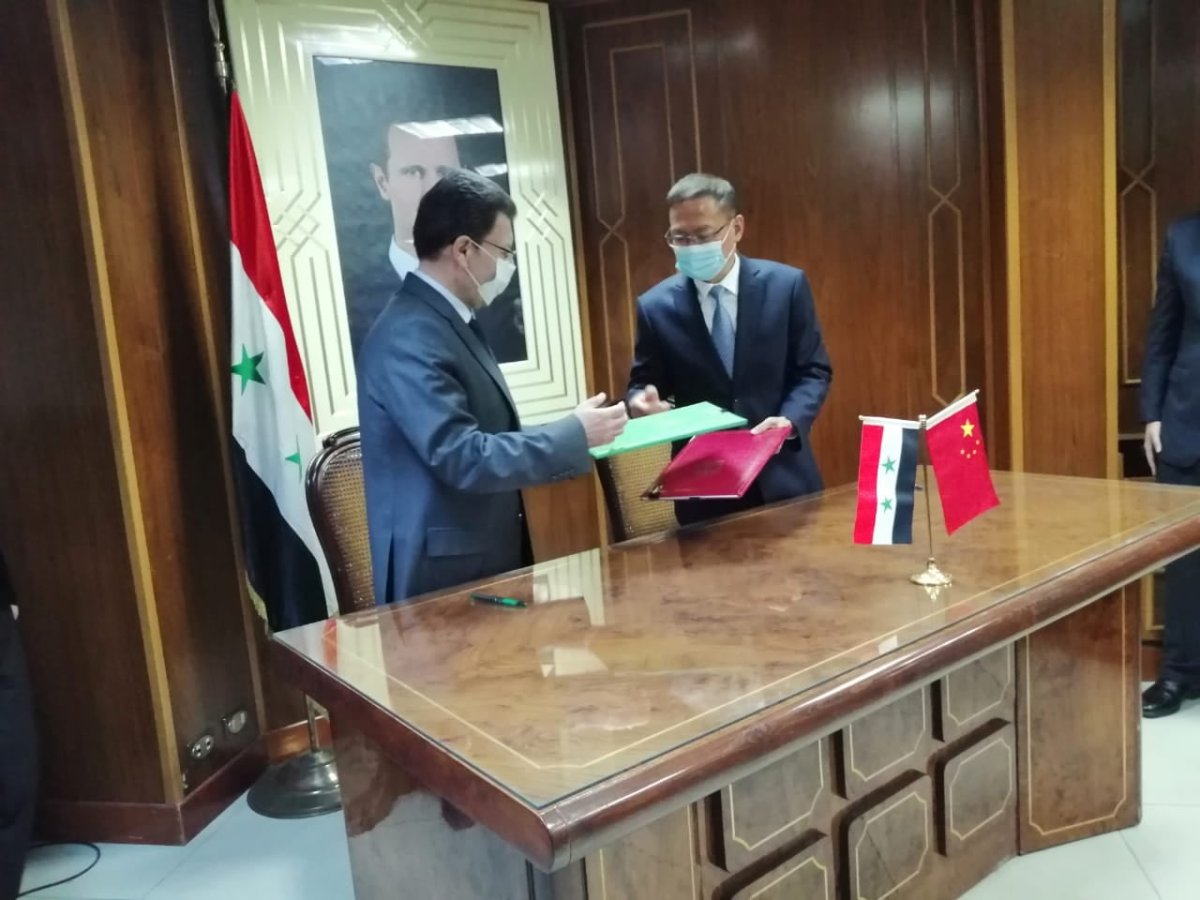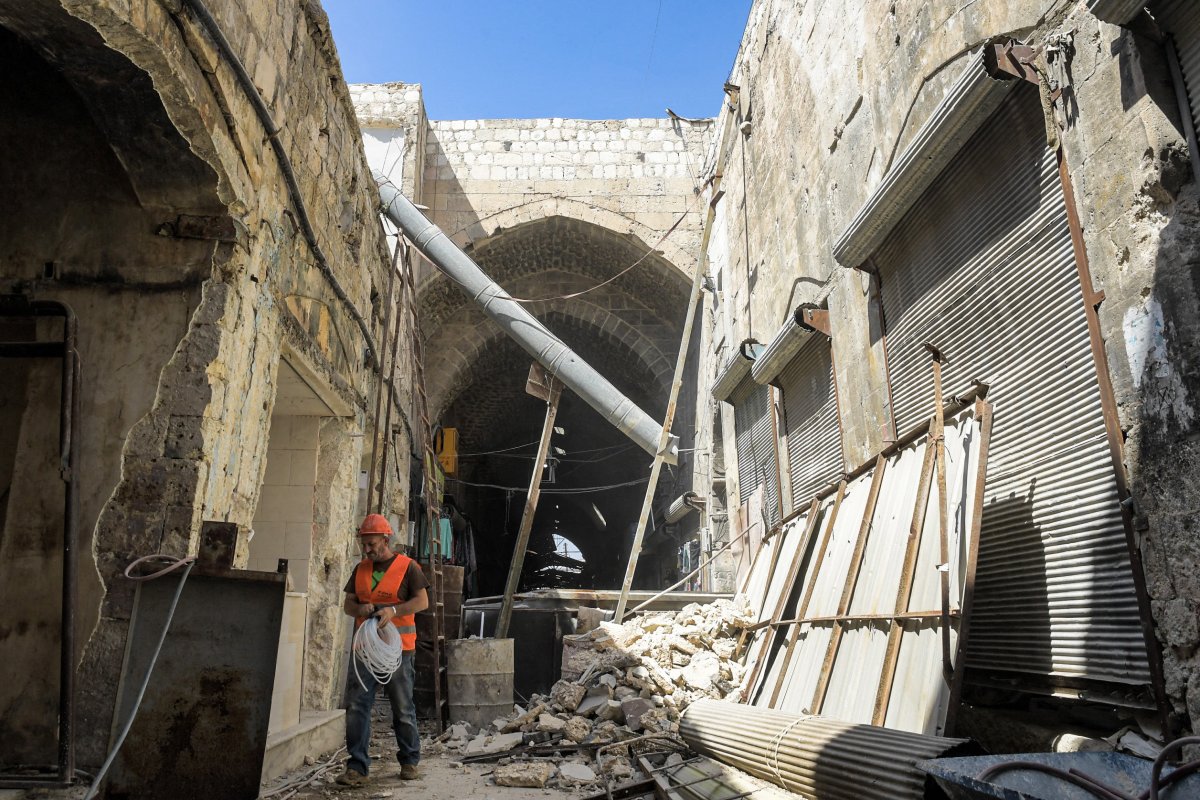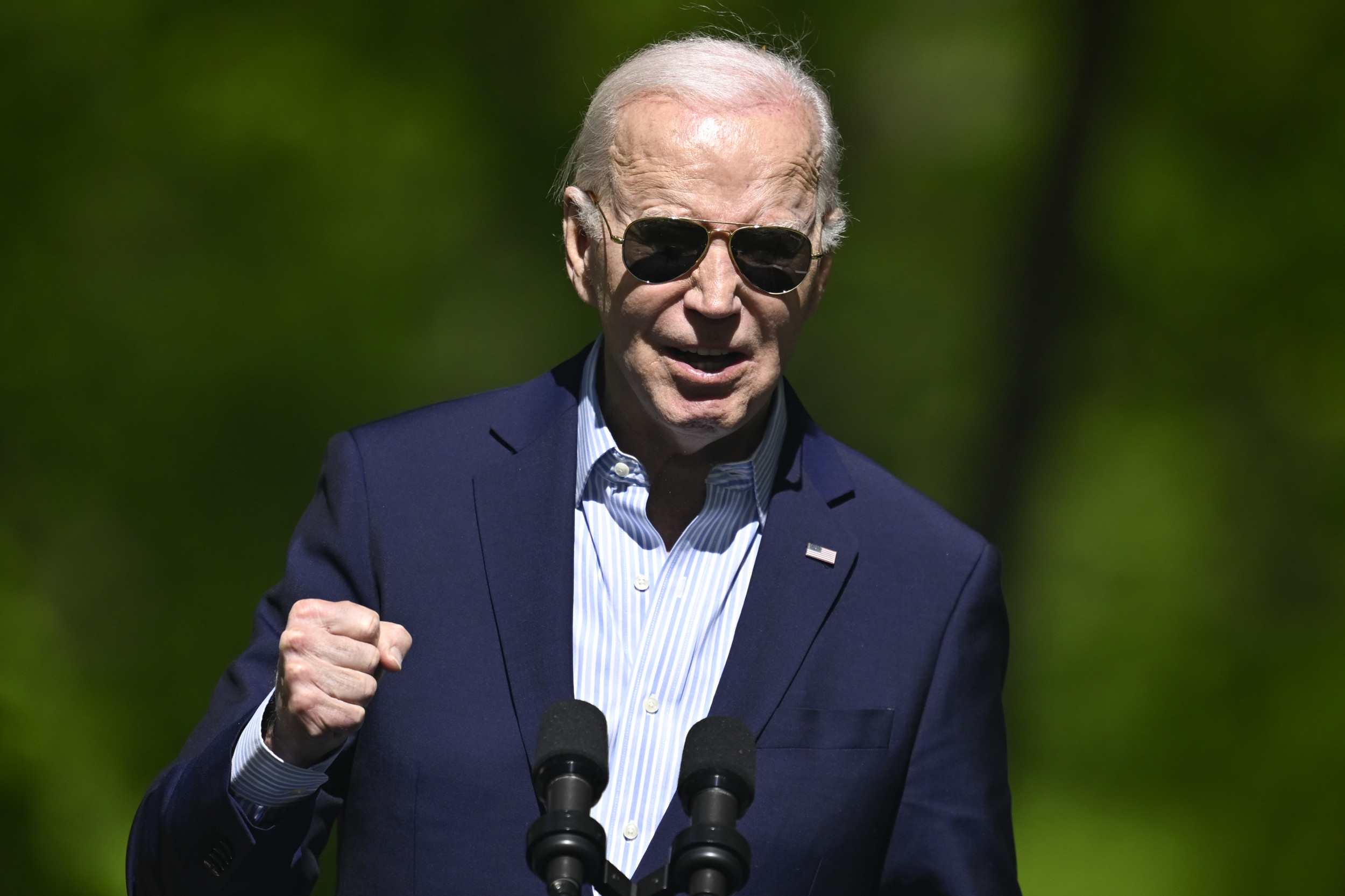Syria has officially joined China's intercontinental Belt and Road Initiative, defying strict U.S. sanctions in hopes of securing a lifeline for lucrative investment in a country still ravaged by more than a decade of civil war.
Damascus' participation was initiated during a ceremony Tuesday through the signing of a memorandum of understanding by Syrian Planning and International Cooperation Authority Chair Fadi al-Khalil and Chinese ambassador to Syria, Feng Biao.
A report published by the official Syrian Arab News Agency and shared by the Syrian authority said the move would broaden opportunities for cooperation with China and partner states involved in the initiative in several areas, including the exchange of goods, technology and capital, as well as help the movement of people between the countries and cultural exchange.
China counts about 150 nations, or more than three-quarters of United Nations member states, are counted as part of the Belt and Road Initiative, most of which have signed memorandums of understanding upon joining. Some 32 international organizations are also involved in the network of projects that promises trade and investment across the globe.
The initiative gets its name from the ancient Silk Road that once ran through Asia, with the Middle East serving as a crossroads to Africa and Europe.
"Syria was one of the foundational nations of the ancient Silk Road, especially the cities of Aleppo and Palmyra, and therefore we shall revive this road through joining this initiative," Khalil said, noting the deal would contribute to "the strengthening of the joint cooperation within the relations of our two friendly countries."
Echoing this, Feng said the pact would "define our goals and guide our projects to deepen the working cooperation between our countries and strengthen the harmonization" between Beijing's Belt and Road Initiative and the policies of Syrian President Bashar al-Assad, while also "strengthing Chinese participation in the economic reconstruction of Syria."

Syria's official entry into the Belt and Road Initiative was highly anticipated as Beijing had emerged early on as one of Assad's political supporters when a conflict that would engulf the Arab country first erupted in 2011. China and Russia utilized their veto powers at the United Nations Security Council to block Western intervention against the Syrian leader months after abstaining to do so in Libya, where longtime leader Muammar el-Qaddafi was unseated and killed by NATO-backed insurgents.
Beijing's relations with Damascus continued even after other regional powers cut ties and an insurgency initially backed by the U.S. and partnered countries took control of much of Syria. The uprising ultimately fractured with more jihadi elements growing stronger, including the Islamic State militant group (ISIS) and factions comprised of Islamist ethnic Uyghur fighters that have previously waged separatist war in China's northwestern Xinjiang province.
While China has not offered overt military support to the Syrian government as have Russia and Iran, Beijing has offered Damascus low-scale investment and humanitarian assistance and has demonstrated an increasing interest to help rebuild the country as stability returned to large swaths regained by the government. Such aid grew even more important as Syria's economy collapsed in recent years and the U.S. issued new, even harsher sanctions in response to allegations of Assad's war crimes.
"For Syria, if China decided to follow through with its promise, this could be a game-changer for Damascus, just because of China's economic weight," Karam Shaar, research director of the Operations and Policy Center and a non-resident scholar at the Middle East Institute, told Newsweek.
Shaar noted, however, that Beijing had far more to offer Damascus than the other way around, and considerable risks still exist when it comes to doing business with a precarious economic and security environment in Syria.
But Syria's strategic geography, in the same strategic position that brought the Silk Road to it in antiquity, is tantalizing, as is securing another political partner aligned with China's broader worldview.
"Now you can see some of the support that Bashar al-Assad provides to China in exchange is kind of cosmetic, but still useful politically," Shaar said. "So Syria, for example, is always on mainland China's side when it comes to Hong Kong, when it comes to Taiwan and so on."
Signs that a potential Sino-Syrian agreement was soon coming emerged last year as Chinese Foreign Minister Wang Yi visited Damascus last June and Chinese President Xi Jinping phoned Assad in November. These exchanges were accompanied by an uptick in both countries expressing solidarity with one another's positions on major global issues, including their respective disputes with Washington.
China's embassy in Damascus released on Wednesday a summary of a recent interview by Syrian Foreign Minister Faisal el-Mekdad and Deputy Foreign Minister Bashar al-Jaafari with Chinese media outlets. In it, both senior diplomats criticized the U.S. approach to global statehood, as well as President Joe Biden's "Summit for Democracy" held virtually last month with around 100 leaders in attendance.
"Both Mekdad and Jaafari said that there are many models of democracy, and the political, economic and social development conditions of countries in the world are different, and the democratic models chosen should also be different," the Chinese embassy readout said. "They pointed out that the essence of American democracy is a false, selfish and capitalist democracy. They condemned the so-called 'Leaders' Democracy Summit' held by the United States for exercising hegemony in the name of democracy, which has exacerbated the division of the international community."
On the other hand, it was said that the pair "spoke highly of the major concept of whole-process people's democracy put forward by Chinese President Xi Jinping and the great achievements China has made in democratic practice under the leadership of the Communist Party of China in recent years, which are worth learning from all over the world."
And in a preview of what was to come, the embassy noted that Mekdad and Jaafari "praised China's persistent adherence to the democratization of international relations" and said that the "'Belt and Road" Initiative has created huge development opportunities for countries along the route, and made important contributions to maintaining world peace and stability and promoting the coordinated development of all countries."
Chinese officials have also hit out at sanctions and uninvited foreign military activity in Syria, especially that of the U.S. and the coalition it led against ISIS in parallel with a pro-government campaign backed by Russia and Iran.
"Over the past two decades, the U.S. military launched over 90,000 airstrikes in other countries, which led to about 48,000 civilian deaths," Chinese Foreign Ministry spokesperson Zhao Lijian said at a press conference last month. "Up to 1,600 civilians were killed in 'the most precise air campaign in history' in Raqqa, Syria alone. Bullets, explosives and missiles from the U.S. have taken tens of thousands of innocent lives and displaced hundreds of thousands. Behind every number is a precious human life."
He referred to the U.S. intervention in Syria as part of a series of "wars of aggression" that also included military operations in Afghanistan, Iraq and Libya.
A week later, Zhao again brought up Syria alongside other targets of U.S. policies, telling journalists that "amid the pandemic, the U.S. has not reduced but increased unilateral sanctions on Iran, Cuba, Venezuela, Syria and other countries, making it difficult for them to access anti-epidemic medical supplies and humanitarian assistance in a timely manner and placing artificial obstacles in their fight against COVID-19."

With Assad still firmly in power in spite of the economic crisis and lingering conflict, a number of regional powers have moved to rebuild ties with Syria, including close U.S. partners Bahrain, Jordan and the United Arab Emirates.
State Department spokesperson Ned Price spoke out against this trend during a press conference Wednesday.
"We have been very clear that we are not encouraging, and in fact, we believe that the conduct that the Assad regime has demonstrated, including the atrocities it has inflicted on its own people – this is not the time for rehabilitation of the Assad regime," Price said. "In some ways, this is a regime that cannot be rehabilitated, given what the Assad regime has inflicted on its own people."
But in response to insinuations that the U.S. was not actively discouraging such actions, Price declared noted that "countries are free to choose their own foreign policy course."
Assad's longtime backers Moscow and Tehran have also sought to bolster relations with Damascus.
As Khalil and Feng signed their memorandum of understanding, Syria also hosted delegations from both Russia and Iran on Wednesday.
Assad himself received visiting Iranian Roads and City Building Minister Rostam Qassemi, who also serves as head of the Iranian-Syrian Joint Economic Committee and to whom the Syrian leader "stressed the importance of establishing new projects that achieve the common strategic benefit of Syria and Iran and link the business sectors in both countries," according to his office.
"The conversation also dealt with ways to expand the fields of bilateral work in the public and private sectors, and encourage joint investments with the aim of giving a new impetus to trade and economic ties between the two countries in all fields that serve the interests of the two friendly peoples," the Syrian presidency's readout added.
Uncommon Knowledge
Newsweek is committed to challenging conventional wisdom and finding connections in the search for common ground.
Newsweek is committed to challenging conventional wisdom and finding connections in the search for common ground.
About the writer
Based in his hometown of Staten Island, New York City, Tom O'Connor is an award-winning Senior Writer of Foreign Policy ... Read more
To read how Newsweek uses AI as a newsroom tool, Click here.








